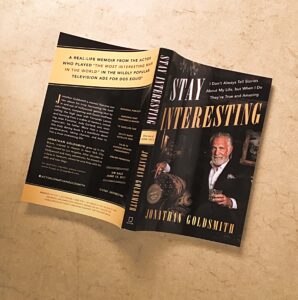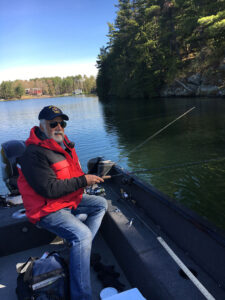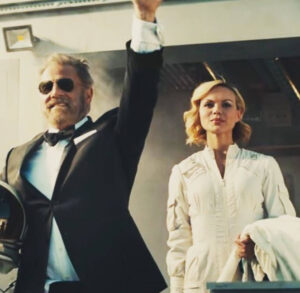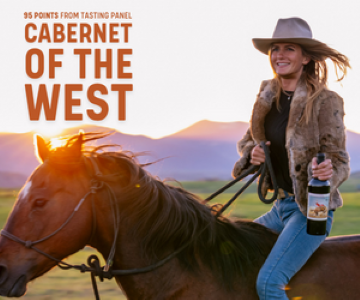
AT 82, THE ACTOR WHO BECAME DOS EQUIS’ MOST INTERESTING MAN IN THE WORLD IS EFFORTLESSLY MANAGING TO “STAY INTERESTING”
by Jonathan Cristaldi
“He once parallel parked . . . a train. He once gave a pep talk so compelling that both teams won. His words carry weight that would break a less-interesting man’s jaw.”
These are but a few of the unmistakable lines delivered by Dos Equis’ Most Interesting Man in the World. Played by actor Jonathan Goldsmith, the character was inspired by a friend of his, the late Argentinian film director and actor Fernando Lamas—a man with a “deep tan and luxurious shining hair,” as described by Goldsmith in his memoir Stay Interesting: I Don’t Always Tell Stories About My Life, but When I Do They’re True and Amazing.
Goldsmith’s appearance could be described similarly during the decade he spent playing the role he’d been “rehearsing for all my life,” as he puts it. Today, the 82-year-old Goldsmith isn’t as tan as he was in his 70s, but he’s just as sharp, quick-witted, and, of course, interesting, though you don’t have to take my word for it—you can take his. If Stay Interesting didn’t end up on your reading list when it was published in 2017, the best thing you can do right now is order a copy and buckle up: In the first chapter, you’ll find yourself in the passenger seat of his ’65 Ford Diesel on the way to the Dos Equis audition. From that point on, you’re subject to the raw reality of a longtime actor made so famous by the outcome of that single late-in-life audition that he was pegged to be the surprise guest for President Barack Obama’s 50th birthday celebration at Camp David.

Goldsmith’s story offers a glimpse into the kind of perseverance that is essential to driving a successful actor’s career. It also reveals what can happen when an already-strong brand identity meets viral stardom: Goldsmith’s Most Interesting Man in the World achieved a level of celebrity in the beverage industry that can perhaps only be rivaled by Orson Welles, who appeared in Paul Masson commercials in the late 1970s and early ’80s. Welles was already widely famous, but the lesser-known Goldsmith’s meteoric rise solidified his status as an instantly recognizable Hemingway-type character of the booze world—doing for Mexican lager what, say, James Bond did for Bollinger Champagne.
The numbers clearly spoke to the campaign’s success: In March 2016, shortly after Dos Equis announced that it would be retiring Goldsmith’s character, Money reported that as sales of imported beer dropped by about 4% in 2009, the Heineken-owned brand saw a 22% rise—not to mention a whopping 34.8% total growth between 2007 and 2016. That’s astonishing, but what was less spectacular was the reaction to the new, younger Most Interesting Man meant to reign supreme in Goldsmith’s stead. Do you remember his name? Yeah, neither does anyone else.
So, what exactly has Goldsmith been up to in “retirement”? In November 2019, I made good on an invitation to visit him at his home in Manchester, Vermont, to find out. My wife, Amanda, came along, and once we’d pulled through the gates, the greeting party of two large dogs, Willie and Zoey, arrived to sniff us out before the boss arrived. A few moments after the canine interrogation, Goldsmith emerged from the garage, and although it was after dark, he was characteristically sporting a pair of sunglasses. He waved the dogs away and greeted us with a wide grin. “I don’t always host people in Vermont,” he said, skipping the punchline and ushering us up a set of stairs into a long, expansive, and lavish kitchen, where he’d prepared Martinis the size of our heads. For an octogenarian, he looked as fit as a lumberjack—a fitting comparison, as he then led us to sit in front of a roaring fire fueled by nicely cleaved hunks of Vermont maple that he’d chopped himself. I’d brought a couple Aurora Preferidos Connecticut cigars, so before we got down to business, we lit ’em up.
We talked for a couple of hours, stopping intermittently to nurse our giant Martinis between puffs and bites of salami from the charcuterie platter Goldsmith had prepared; he then led us on a tour of the house before sending us off into the wintery Vermont night.
But our encounter was far from over: I’d initially planned on writing about his work with Astral Tequila, but it had soured (more on that later), so I decided to call him nine long months into the pandemic to put a button on last year’s conversation. I’d caught him on a break from chopping wood once again, and we talked about how he’d navigated the tumult of 2020 before I pressed him on some subjects in his book that I’d been turning over in my mind since reading it.
I also asked Goldsmith what he was planning on making for Thanksgiving in a few days’ time. “Butterflied leg of lamb on the grill, seasoned with oregano, garlic, and lemon,” he said without hesitation, adding that he and his wife, Barbara, would enjoy it alongside “a nice Sangiovese after a gin Martini.” (He pronounced it Sahn-gee-oh-vay-suh, like an Italian Dean Martin.)
Living in Vermont during the pandemic must be tough, I suggested. “It’s gorgeous,” he told me. “I tell all my friends who take pity on us that we’re isolated in paradise.”
That summer, he’d spent half of his waking hours gardening, raising tomatoes, radishes, lettuces, eggplant, cucumber, and squash; the other half was spent fishing bass, northern pike, and pickerel out of a rowboat with a 9-horse-power engine on Lake Bomoseen near his home. Fishing was something he did with his dad, Milton, so it brings up fond memories. I imagined he’d caught so much fish that health officials were warning the fish to shelter in place, but I didn’t ask about that. I did ask, though, if there were any acting gigs on the horizon, to which he replied, “I work every day; I’m doing numerous Cameos.”

Cameo, I learned through a quick Google search, is a company founded in 2016 that allows fans to purchase short video messages from celebrities, often to send as a gift to family or friends. (Vanity Fair and Fox News have recently reported that some participants—among them Seinfeld’s Larry Thomas, the actor who played the “Soup Nazi”—are earning six-figure salaries for their videos.) Cameo had come in handy during the lockdown days for Goldsmith, who revels in the personal connection it creates with fans. It also gives him something to do when it’s 10 degrees outside.
As the cold comes in, out come the brown spirits: Goldsmith finds that they pair nicely with the harsh Vermont winters and a good cigar. “I always like Scotch—Laphroaig,” he said resolutely. “Also, WhistlePig bourbon, which is indigenous to Vermont and just a couple of hours from the house.” He drinks it on the rocks with a drop of pure water from the pond on his property.
I then posed a professional question, as I figured that Goldsmith was in a unique place as an actor since the Dos Equis icon he’d created was eternally banned to Mars. But for the right wine or spirit brand waiting in the wings, reprising a role as a brand ambassador surely isn’t off the table; after all, when he’d finally put down the beer, he’d been sought out by Astral Tequila to star in its “This Calls For Tequila” campaign. But in August 2020, Diageo announced that it was buying Astral’s parent company, Davos Brands, and moving in a different direction.
“You’ve now marketed to both a beer-drinking crowd and a spirit-drinking crowd, so what do you think is the fundamental difference between the two?” I asked. “It’s an all-American thing to drink beer, and I usually find it’s not mixed,” Goldsmith answered. “People like beer or they like cocktails and good wine. I don’t see much crossover.” That said, he plainly loved the spirit side of the industry. “[Astral] was a wonderful product,” he reflected. “I hope they will be successful.”
Goldsmith also loves Aviation Gin, another Davos Brands label, so I asked him to disclose his recipe for the best gin Martini. “Leave off the vermouth, [use] just the gin, and serve with blue cheese olives and one black Greek olive so as not to load up on salt. I pour it over rocks and mix it right in the glass—and you must serve it in a Martini glass, or it just doesn’t taste the same,” he said, subtly slipping into that familiar Dos Equis cadence. “And with Scotch, I only drink that out of Waterford Crystal.” Pure class.
He’s also been enjoying Italian Super Tuscans, fine Nebbiolo, and Chianti Classico. Since we were talking vino, I asked him what advice he could give to the gatekeepers of wine shops and wine lists around the U.S. “Keep drinking—it makes isolation so much better,” he said. “As far as what they should buy for their customers, something reasonably priced. I think people are drinking more, so perhaps carry wines that are more affordable but still with quality.”
Goldsmith isn’t much of a wine collector, and although he could afford any bottle he desires, he’s a practical buyer, preferring to nab what’s on the shelf at his local wine shop. He’s been enjoying Josh Cellars and Wild Horse Cabernets, but a “good Champagne is [also] nice once in a while.” He told me that 50 years ago, when he’d taken a bartending course in New York City, the sommelier running the class told him that the best Champagne was from the Finger Lakes region. That guy is lucky that Goldsmith doesn’t remember his name, because I would have printed it here for all to see.
As I mentioned, I had a few questions about some chapters in his book. First, did he know that actor Fred MacMurray, whom he’d appeared with in an episode of My Three Sons in 1966, made wine as the owner of MacMurray Estate Vineyards, and that Fred’s daughter Kate was still involved with the business? Goldsmith had recounted in his book that in a scene with MacMurray and actress Dana Wynter, he’d blown his lines repeatedly and capped it all off by accidentally dumping wine on Wynter. “She had on a beautiful white gown,” Goldsmith recalled, “and the red wine was quite vivid. I still get a rush of heat when I think about it.” He’d also been shot by John Wayne—shot by the Duke!—dozens of times in the 1976 film The Shootist, and I wondered aloud if there was anyone else he’d be as honored to be shot by onscreen. He’d be OK with President Obama pelting him with rubber bullets if it were for an action movie.
In addition to his film roles, Goldsmith was a regular on iconic TV shows such as Dallas (for 19 episodes) and Dynasty; he also played a doctor on both Days of Our Lives and General Hospital. I asked if he would channel his Most Interesting Man voice to say, “I’m not a doctor, but I played one on TV,” and he politely demurred: “Next question.” I then asked him to confirm or deny that he’d appeared on Star Trek, because the internet certainly seems to believe that he played a redshirt who was miraculously not killed by Captain Kirk. “It’s not me,” he said, “but I did work with [William] Shatner on T.J. Hooker.”
He didn’t have much to say about Shatner, so I asked him to name the most gracious actor he’d ever worked with. “Henry Fonda,” he said. “He was down to earth and humble. One day, I was running lines on a show with him, and I said, ‘Ya know, I always worry about if I‘m going to work again.’ And he said to me, ‘When the show is over, I’m always depressed, and I don’t know if I’ll work again.’” The realization that even established Hollywood elites experience moments of insecurity was a revelation for Goldsmith.

I figured that if he’d once been a surprise guest for Obama, there might be a chance that President-elect Joe Biden would call him to serve as a member of his cabinet. I asked Goldsmith which position he would accept. “Foreign Relations and Domestic Joy,” he said fervently.
The conversation then flowed to yet another topic: music, specifically the one genre he loves to listen to after too many cocktails. “I love opera [and] jazz—Ramsey Lewis and Dave Brubeck,” Goldsmith said, adding that he’s thinking of taking singing lessons again, maybe at Bennington College. If he hadn’t been an actor, he noted, he’d have been an opera singer or chef.
But his latest calling has been marriage—as in marrying other people in outdoor, socially distanced weddings as a minister with the Universal Life Church. (If he could make it work, he’d probably officiate through Cameo.) He also serves as the chairperson for Make-A-Wish Vermont and judges the organization’s annual “Vermont Beardies” contest, which raised over $60,000 this year. Goldsmith is passionate about philanthropy: He told me that he once wanted to be a social worker, a claim he also makes at the beginning of his book.
As the story goes, he enrolled in a well-known university in New York City, hoping to leave with a bona-fide degree in psychology, but he concedes that he was not a good student; as he put it, “I was living a fatuous life.” (He’d gotten involved with the wife of a professor, who, it seems, ran Goldsmith out of school.)
Frankly, the world didn’t need Goldsmith to be a shrink anyway: It needed him to forge the path that would culminate in a certain audition, essentially divine intervention in the form of an unforgettable role. The beverage industry owes a huge debt of gratitude to Goldsmith and Dos Equis for proving that it can take itself less seriously and still be successful. The Most Interesting Man in the World may have gone to Mars, but we’re all still quoting him back here on Earth—and still drinking Dos Equis.
So here’s what I suggest you do, my friends. Search for the 1978 film Go Tell the Spartans, which is free on YouTube, and watch a 37-year-old Goldsmith act opposite the legendary Burt Lancaster. Goldsmith gives a knockout performance, right up to a surprising and gut-wrenching scene in the middle of the movie that involves his character, Sgt. Oleonowski. Then, read Stay Interesting to fully understand the transformation of that 37-year-old Oscar hopeful into the ultimate personification of The Most Interesting Man in the World.
And after that, as you’re inevitably telling anyone who’ll listen to “Stay thirsty, my friends” in your best impersonation of Goldsmith, don’t forget about the actor himself, a fascinating man in his own right who, in channeling an eccentric friend, brought us all a decade of joy and laughter—making an indelible impression not only on the beverage world but on popular culture in the process.


